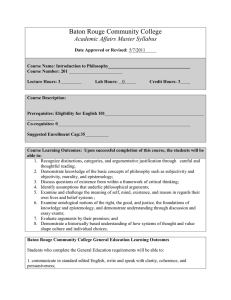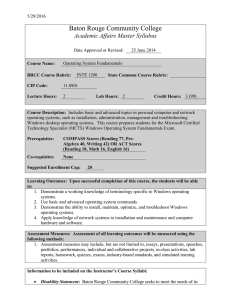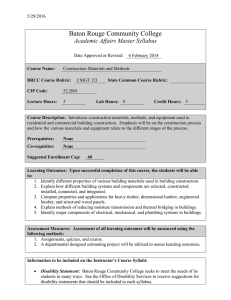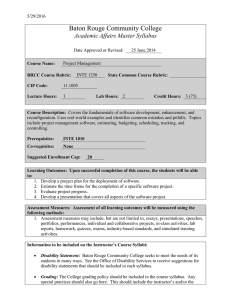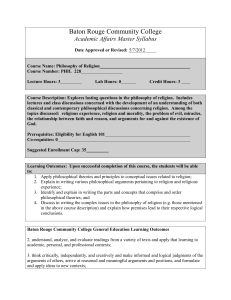Baton Rouge Community College Academic Affairs Master Syllabus
advertisement
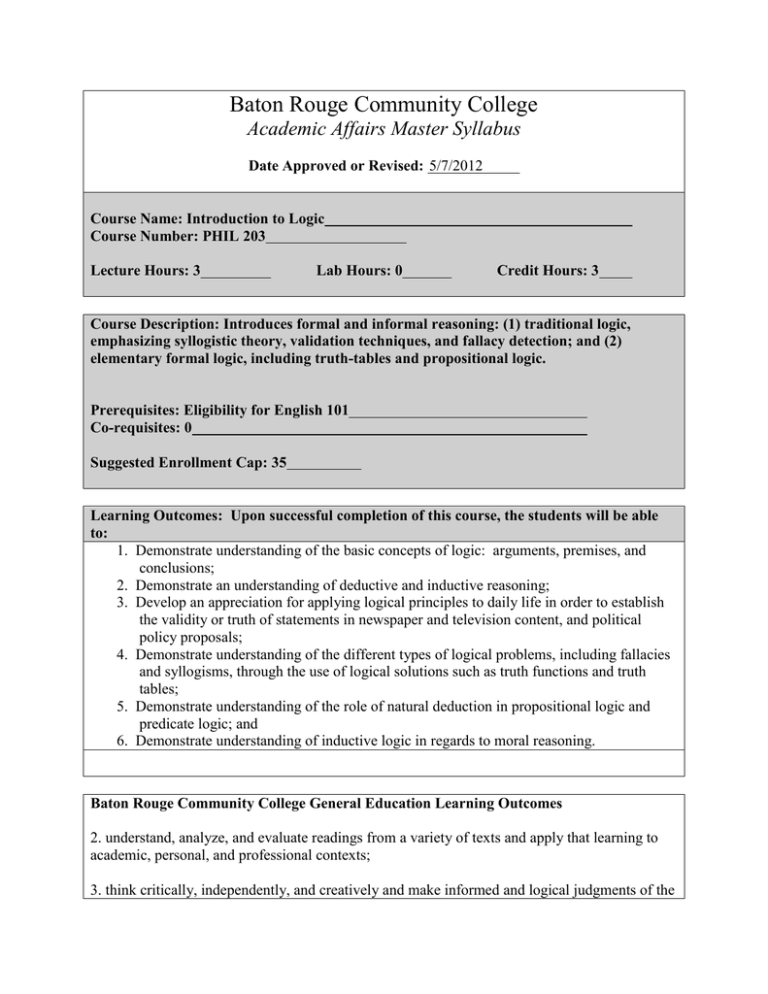
Baton Rouge Community College Academic Affairs Master Syllabus Date Approved or Revised: 5/7/2012 Course Name: Introduction to Logic Course Number: PHIL 203 Lecture Hours: 3 Lab Hours: 0 Credit Hours: 3 Course Description: Introduces formal and informal reasoning: (1) traditional logic, emphasizing syllogistic theory, validation techniques, and fallacy detection; and (2) elementary formal logic, including truth-tables and propositional logic. Prerequisites: Eligibility for English 101 Co-requisites: 0 Suggested Enrollment Cap: 35 Learning Outcomes: Upon successful completion of this course, the students will be able to: 1. Demonstrate understanding of the basic concepts of logic: arguments, premises, and conclusions; 2. Demonstrate an understanding of deductive and inductive reasoning; 3. Develop an appreciation for applying logical principles to daily life in order to establish the validity or truth of statements in newspaper and television content, and political policy proposals; 4. Demonstrate understanding of the different types of logical problems, including fallacies and syllogisms, through the use of logical solutions such as truth functions and truth tables; 5. Demonstrate understanding of the role of natural deduction in propositional logic and predicate logic; and 6. Demonstrate understanding of inductive logic in regards to moral reasoning. Baton Rouge Community College General Education Learning Outcomes 2. understand, analyze, and evaluate readings from a variety of texts and apply that learning to academic, personal, and professional contexts; 3. think critically, independently, and creatively and make informed and logical judgments of the arguments of others, arrive at reasoned and meaningful arguments and positions, and formulate and apply ideas to new contexts; 4. comprehend and apply quantitative concepts and methods to interpret and critically evaluate data and to problem-solve in a variety of contexts demanding quantitative literacy; Assessment Measures: Assessment of all learning outcomes will be measured using the following methods: 1. Exams/Quizzes 2. Homework: Problem-sets 3. Evaluation of media writing to check the argument for logical consistency, which includes, but is not limited to, validity/invalidity and soundness/unsoundness and cogency. Information to be included on the Instructor’s Course Syllabi: Disability Statement: Baton Rouge Community College seeks to meet the needs of its students in many ways. See the Office of Disability Services to receive suggestions for disability statements that should be included in each syllabus. Grading: The College grading policy should be included in the course syllabus. Any special practices should also go here. This should include the instructor’s and/or the department’s policy for make-up work. For example in a speech course, “Speeches not given on due date will receive no grade higher than a sixty” or “Make-up work will not be accepted after the last day of class.” Attendance Policy: Include the overall attendance policy of the college. Instructors may want to add additional information in individual syllabi to meet the needs of their courses. General Policies: Instructors’ policy on the use of things such as beepers and cell phones and/or hand held programmable calculators should be covered in this section. Cheating and Plagiarism: This must be included in all syllabi and should include the penalties for incidents in a given class. Students should have a clear idea of what constitutes cheating in a given course. Safety Concerns: In some programs this may be a major issue. For example, “No student will be allowed in the safety lab without safety glasses.” General statements such as, “Items that may be harmful to one’s self or others should not be brought to class.” Library/ Learning Resources: Since the development of the total person is part of our mission, assignments in the library and/or the Learning Resources Center should be included to assist students in enhancing skills and in using resources. Students should be encouraged to use the library for reading enjoyment as part of lifelong learning. Expanded Course Outline:* I. Basic Concepts a. Statements b. Validity/Invalidity c. Sound/Unsound d. Strong/Weak e. Cogent/Uncogent II. Logic and Language III. Informal Fallacies IV. Statement Logic a. Symbolic Representation b. Truth Tables V. Induction *In addition to the textbook, the above topics will be discussed from within the context of various forms of media, such as: newspapers (letters-to-the-editor, op/ed columns), television, political speeches, and legal arguments.
